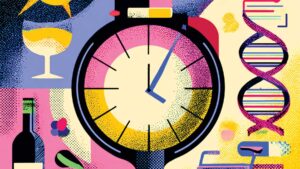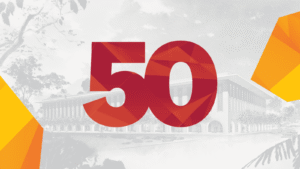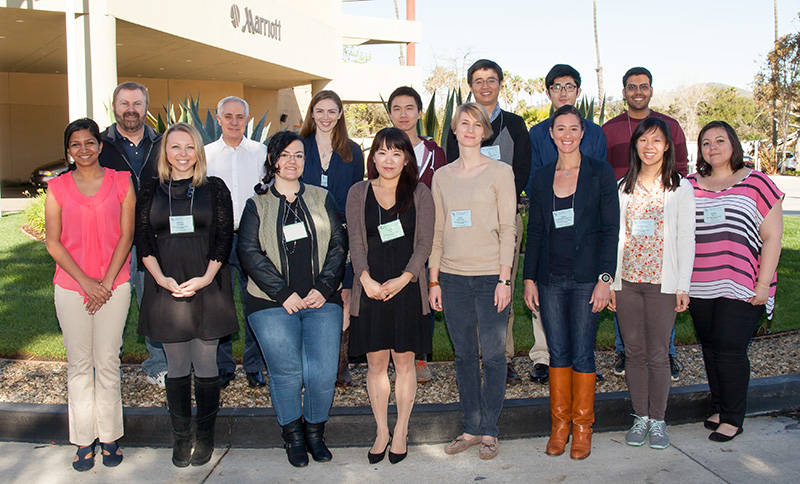
back row (left to right): USC FRI Directors Kelvin J. A. Davies and Enrique Cadenas; USC-FRI members Helen Johnston-Carey, Qi (Jackey) Jia, Fei Yin, Zhigang Liu, and Ishan Patil. Front row (left to right): USC-FRI members Aarti Mishra, Rachel Raynes, Mafalda Cacciottolo, Kyung Kim, Anna Papinska, Laura Corrales-Diaz Pomatto, Jacqueline Lo, and Maira Soto. (Photo by Veronica Slavin of Photography By Design.)
Sixteen USC professors, post-doctoral fellows and graduate students attended the 2015 Gordon Research Conference on Oxidative Stress & Disease supported by the USC Free Radical Institute (FRI) March 1-6 in Ventura, Calif.
The Gordon Research Conferences (GRCs) provide an international forum for the presentation and discussion of frontier research in the biological, chemical, and physical sciences as well as their related technologies. GRCs are different from other scientific conferences because they offer a unique ambience favoring discussions and exchange of opinions between junior and senior researchers, industry, and academia. Scientists with common professional interests come together for a full week of intense discussion and examination of the most advanced aspects of their field.
The 2015 GRC on Oxidative Stress and Disease, one of many GRCs offered in different fields this year, focused on how changes in redox signaling trigger and participate in age-related diseases. The emerging role of redox signaling dysfunction is gaining significant support in the fields of aging and age-related disease—diabetes, ocular dysfunction, stroke, heart disease, cancer, etc.—and challenges the current paradigm that damage by reactive oxygen and nitrogen species to macromolecules is the primary pathologic event that drives aging.
The conference’s invited keynote speakers included USC FRI Director Kelvin J. A. Davies, Dean of Faculty and Research at the USC Leonard Davis School of Gerontology; FRI Co-Director and USC School of Pharmacy Professor Enrique Cadenas; and USC Leonard Davis School Dean Pinchas Cohen. In addition, USC Leonard Davis postdoctoral scholar Rachel Raynes and PhD student Laura C. D. Pomatto were both selected to give oral presentations at the meeting, and 13 posters were presented by other USC post-doctoral fellows and students.
“The program drew from a diverse field of both well-established and emerging scientists and clinicians from across the globe who are at the forefront of their field,” Davies said. “USC FRI scientists have long been considered a major force in the free radical and oxidative stress field and, as we were by far the single largest group at the meeting, this preeminent position was further solidified.”

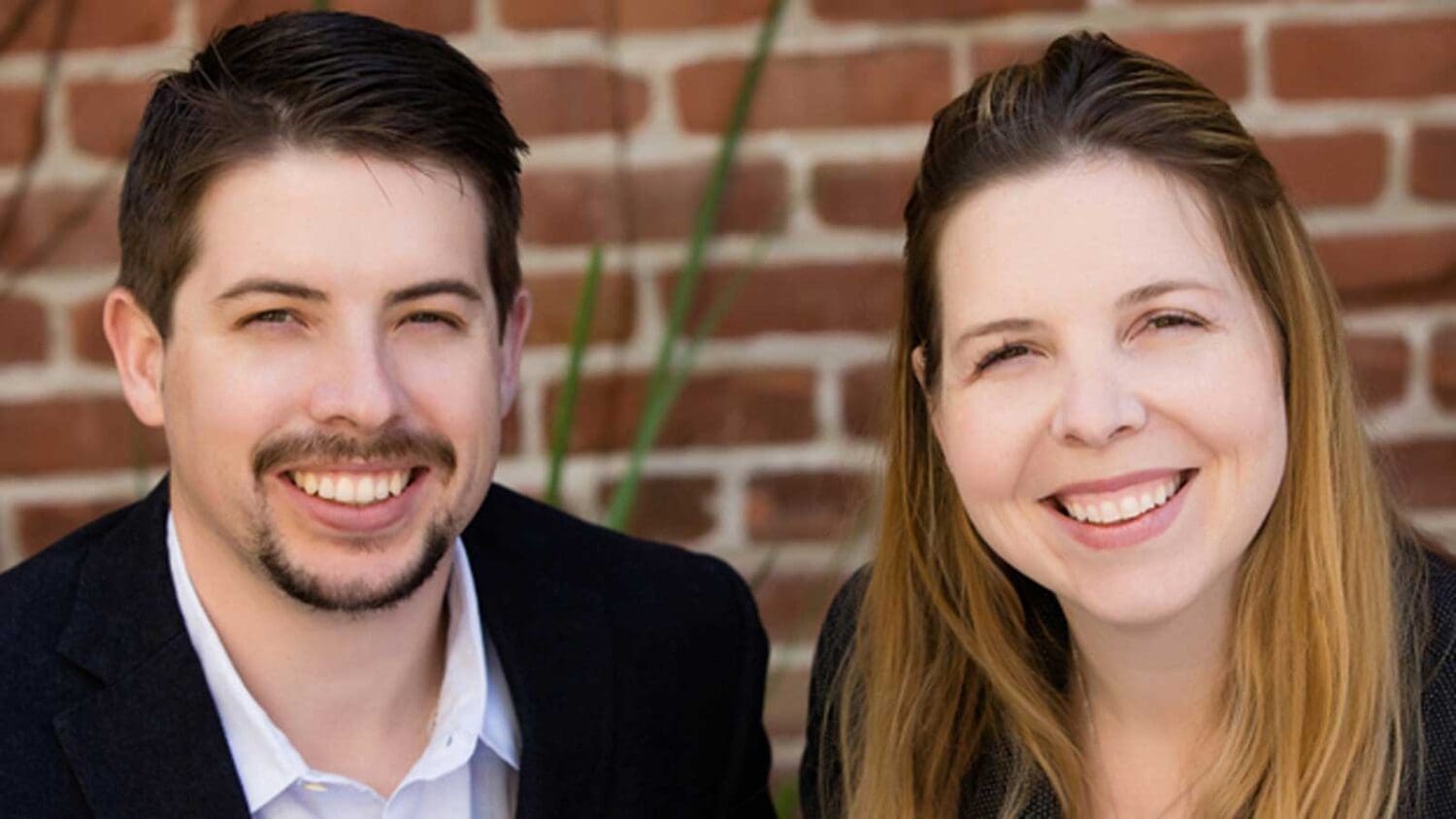
Rather than being a vague descriptor, frailty in older adults could be thought of as a clinical syndrome characterized by distinct physiological events, according to Columbia University Mailman School of Public Health Dean Linda Fried.
Fried made the assertion during the 2015 Kesten Memorial Lecture at the USC Leonard Davis School of Gerontology February 26. The Kesten Lectureship is an annual honor given to a leader in aging research; previous recipients include luminaries of aging study such as Leonard Hayflick and “father of gerontology” Nathan Shock.
USC Leonard Davis Dean Pinchas Cohen introduced Fried as a respected leader in epidemiology and geriatrics, praising her as someone who has “dedicated her career to the science of healthy aging.” He noted that Fried is also the senior vice president of Columbia University Medical Center, a recipient of the U.S. Congress’ Living Legend in Medicine recognition, and the creator of the Experience Corps, a scientifically designed community-based program that connects senior volunteers to kids in public schools in 19 cities.
Fried stated that the typical symptoms people think of when they picture a frail person—shrinking stature, slow movement, weakness, low activity, and low energy—illustrate a “cycle of frailty” that builds on itself and is a chronic, progressive process.
“This is a very vicious cycle that can be kicked off at any point and can become a downward spiral,” she said.
At its heart, frailty appears to be a problem connected to energy dysregulation and a decrease in the body’s ability to tolerate, respond to, and recuperate from stressors. A critical mass of physiological problems—such as a combination of inflammation, nutritional deficiency, irregular hormone levels, and other abnormalities in body systems—overpower the body’s natural regulatory processes and “fray the physiological safety net,” Fried explained.
Understanding the physiology of why older adults become frail is key to not only treating frailty and providing accurate prognoses for patients but also preventing its onset. In addition, more research on frailty may indicate changes are needed in the wider health care system in order to effectively address frailty at every stage, she said.
“In an era when so many are focused on improving health care, how can we use the science of what we do to design a system to improve health?” Fried said. “The potential for the prevention or treatment of frailty is high. Many approaches at many levels will be needed.”
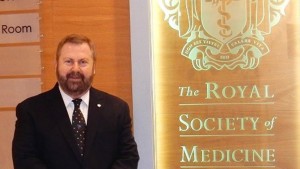
USC Leonard Davis School of Gerontology Professor Kelvin J. A. Davies was recently elected as a Fellow of the Royal Society of Medicine in the United Kingdom.
Scientists are elected to the Royal Society of Medicine following nomination and committee review. An elite group of physicians or scientists are elected annually to fellowship. Elected fellows of the Royal Society of Medicine correspond to members of the Institute of Medicine in the U.S.; famous former fellows include Charles Darwin, Louis Pasteur, Edward Jenner, and Sigmund Freud.
Davies is currently the James E. Birren Professor of the Biology of Aging at USC’s Davis School of Gerontology, where he is also Dean of Faculty and Director of the Andrus Gerontology Center. Davies holds a joint appointment as Professor of Molecular & Computational Biology in Dornsife College of Letters, Arts, and Sciences. He has previously held tenured appointments in both the Keck School of Medicine (Biochemistry) and the School of Pharmacy at USC.
Davies described himself as being “delighted and honored beyond belief” by his election as a Fellow of the Royal Society of Medicine.
“The fields of free radical biology and medicine and the biology of aging, in which I have worked for the past 30-plus years, have really started making significant contributions to human knowledge and to improving health and vitality in our later years,” he said. “I am proud to have been a small part of the advances we have made in these areas.”
Kelvin Davies, a citizen of both the U.K. and the U.S., is a fellow of seven other national or international societies, including the American Association for the Advancement of Science, the Gerontological Society of America, the Society for Free Radical Biology & Medicine, and the Royal Institution (London). He has been awarded honorary doctoral degrees by six universities in Europe, South America, and China, and in 2012 was knighted as a Chevalier de l’Ordre National du Mérite de France (Knight, National Order of Merit of France) by then-President Nicolas Sarkozy for his contributions to science and international cooperation.
Davies’ early education took place in England, after which he earned M.S. and PhD degrees from the Universities of Wisconsin and California, Berkeley. Following postdoctoral training and a junior faculty position at Harvard University, Davies joined the USC Schools of Medicine and Pharmacy, where he earned tenure. He left USC in 1989 to become the Chairman and John A. Muntz University Professor of the Department of Biochemistry & Molecular Biology, and Distinguished Professor of Molecular Medicine in the Department of Medicine, at The Albany Medical College in NY. In 1996 Davies returned to USC to take up his current positions in the Davis School and the College, at the USC University Park Campus.
About the Royal Society of Medicine
The Royal Society of Medicine was established in 1805 as The Medical and Chirurgical Society of London, meeting in two rooms in barristers’ chambers at Gray’s Inn and then moving to Lincoln’s Inn Fields where it stayed for 25 years. The name was changed to the Royal Medical and Chirurgical Society of London in 1834 when the Society was granted a Royal Charter by His Majesty King William IV. The Royal Medical and Chirurgical Society of London eventually subsumed seventeen other medical specialist societies and, with a supplementary Royal Charter granted by Edward VII, became the Royal Society of Medicine in 1907. The objects of the Society laid down by the 1834 Charter are the cultivation and promotion of Physic and Surgery and of the Branches of Science connected with them. The Supplementary Charter of 1907 empowered the Society to create Sections for the cultivation and promotion of any branch of medicine or any science connected with, or allied to, medicine. In 1910 the Society acquired the site on the corner of Wimpole Street and Henrietta Place, which was opened by King George V and Queen Mary in May 1912.



